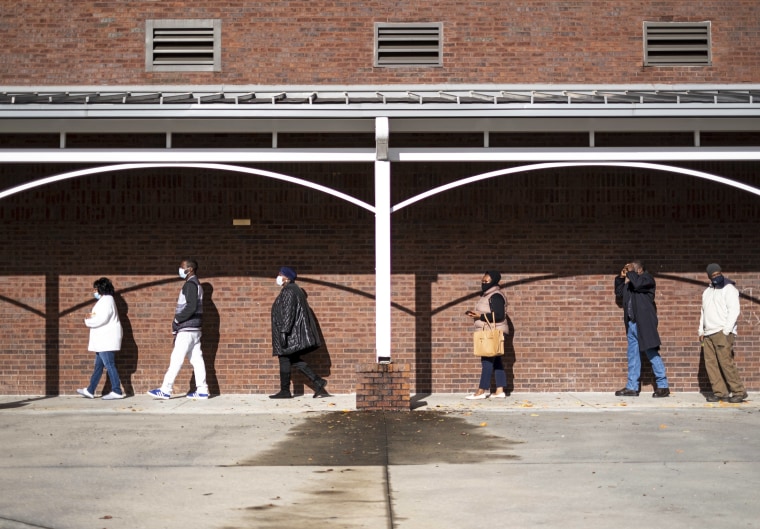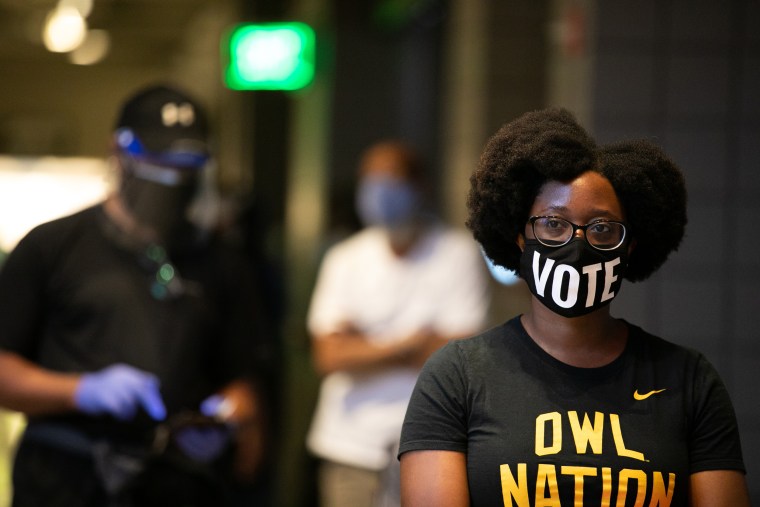Even though Black Americans are among the most affected by inflation, they continue to give President Joe Biden the highest approval rating among any demographic group for his handling of the economy, polls show.
Biden has lost less support among Black voters than among other racial minorities and whites.
"President Biden won 87 percent of the Black vote in the 2020 election and his standing among Blacks remains higher than other groups, but it has lost ground," said Mary Snow, a polling analyst for Quinnipiac University, whose recent polls show that inflation, racial inequality and election laws are the most urgent issues for Black Americans.
Inflation hit 8.5 percent in the U.S. last month, the sharpest year-over-year increase since 1981. Prices have been driven up by strong demand, pandemic-related supply shortages and the cost of energy, propelled by Russia's invasion of Ukraine.
Rising prices have disproportionately affected marginalized groups, specifically African American and Hispanic communities and rural households, both recent polling and research shows. Inflation is particularly devastating to lower-income households, as they are more "exposed" to the goods with the fastest-rising prices, according to a Bank of America research report in November.
"Inflation hurts lower-income households — namely, less-educated and rural households, those with non-managerial workers and minorities — the most," the report said.
A Wall Street Journal poll last month showed that nonwhite voters were more likely than white voters to say inflation is causing major financial strain in their lives.
"Black women and Hispanic men, both at 44%, reported the highest proportions of major strain among various demographic and gender combinations," the Journal reported.
Some political strategists believe Biden still has the support of many Black Americans because the Democratic Party's priorities align with their concerns.
"When we see them attacking the very things that give us the opportunity for upward mobility, we understand that they are not on our side," Brandon Upson, chairman of the South Carolina Democratic Black Caucus, said of Republican lawmakers. "When they turn a blind eye to the issues that face us, we know that we're not their priority."
A year ago, polls showed Biden's approval rating among Black registered voters at 87 percent. Now it's 69 percent, according to Quinnipiac polling.
"Joe made it to the White House because of Black voters," Upson said. "And although there are some Black activists who are upset that he has not gone to the mat in certain ways that they would like, the large majority of Black Americans still approve of his job as president."
Fifty-four percent of Black people who participated in an NBC News poll of adults in March said they approved of Biden's handling of the economy. Comparatively, 28 percent of white people and 36 percent of Hispanic people polled said they approved.
China Dickerson, a Democratic political strategist in Washington, said Biden's decline in support among Black voters should be of concern to the Democratic Party ahead of the midterms.
"I actually think in this very unusual case, Democrats have an issue with Democrats," Dickerson said. "I think the midterms are going to see the backlash of how folks feel about Democrats, not how folks feel about Biden. Democrats are disillusioned with Democrats."
Dickerson said the rising costs of gasoline, groceries and housing have contributed to the disillusionment.
But, she said, Biden isn't to blame.
"Those types of things happen over a period of time," she said. "Inflation happens over a period of time."
"Gas being up, milk being up, rental prices going up is not Biden's fault," Dickerson said. "Now, could he help to mitigate? Absolutely, he can help to mitigate the pain. But if you're an intelligent person, you know that's not Biden’s fault."
She added: "When you have a problem with these things, you're going to look to the person in charge. And the person in charge is Biden. Is it his fault? No. But who's in charge?"
Snow, the Quinnipiac University polling analyst, said there is a clear divide among political parties about where to lay blame for rising gas prices.
"Most Republicans blame the Biden administration, while Democrats blame either the war in Ukraine or oil companies," Snow said. "Those political divisions are reflected in the different responses among racial groups."
A March 30 Quinnipiac University poll showed that only 8 percent of Black voters said the Biden administration's economic policies were to blame for rising gasoline prices, compared with 50 percent of white registered voters and 39 percent of Hispanic registered voters.
According to an April 6 Quinnipiac University poll, 62 percent of Black registered voters said they approved of Biden's handling of the economy, compared to 34 percent of white voters and 31 percent of Hispanic voters.
Tina McCormick, 56, an instructional aide at a charter school in Newark, New Jersey, who hosts or attends weekend pop-up events where she sells food she cooks, said inflation has impacted her.
Before food and gas prices started to rise, she would make $600 to $700 per event. Now, McCormick, who is Black, said she's lucky if she takes home $300.
"I've had vendors come all the way from Illinois or Philly, but because of the gas prices, they don't want to come that far," she said.
On Saturday, she and other volunteers handed out groceries at the Universal Church of the Kingdom of God in Newark, where McCormick said the need has tripled or quadrupled.

"There were more families coming to get food than we actually have in a service," she said.
When asked what she thinks of the Biden administration's handling of the economy, McCormick said she was unsure. One thing she is certain of, however, is that she will not vote for a Republican candidate.
"There's no way on God's green Earth that I would vote for a Republican because they are not for us," McCormick said. "They're more concerned with wealthy people. I actually feel that the only Black people who will vote Republican are those who have assets, and I don't mean a little assets, I mean a lot."
Ra Shad Frazier-Gaines, a progressive who worked on the presidential campaigns of former President Barack Obama in 2012 and Amy Klobuchar in 2020, said he doesn't foresee Republicans gaining significant support with disillusioned Black Americans. There's an unspoken and unwritten rule in the Black community that Democrats have their backs, Frazier-Gaines said.
"For the most part, there are lots of Black people that believe that the Democrats have their best interests at heart," Frazier-Gaines said, adding that he did not believe that to be true.
Still, Frazier-Gaines, president of Amplify Action Fund — which seeks to educate and mobilize voters, especially Black men — said many Black Americans do not see the Republican Party as an option because its values are out of touch.
"Every time I turn around, you have an outlandish racist Republican getting on TV, saying things that are just radical, far-right and crazy," Frazier-Gaines said. "Unless I am extremely wealthy or just have a self-hate complex, I can't see myself rocking with anything that the Republicans have to say."

